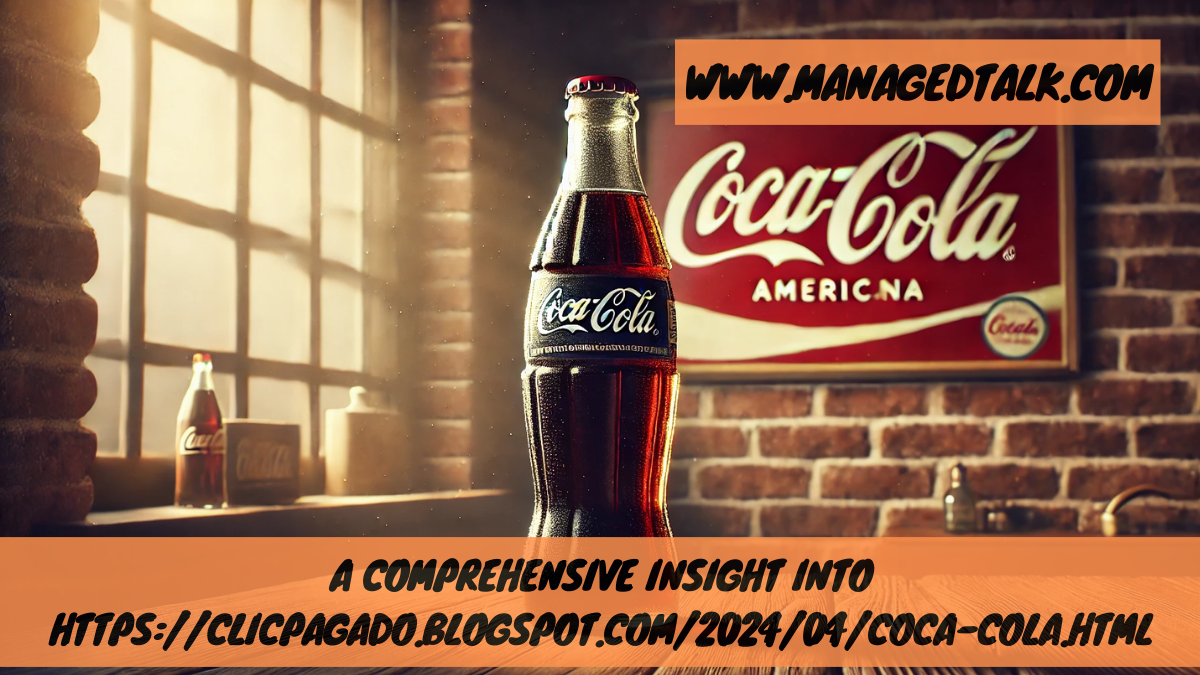1. Introduction
Coca-Cola, a name synonymous with refreshment, represents more than just a beverage—it is an integral part of American culture. This article dives deep into the history, marketing strategies, innovations, and challenges faced by Coca-Cola as highlighted in “https://clicpagado.blogspot.com/2024/04/coca-cola.html”.
2. History of Coca-Cola: From Humble Beginnings to Global Icon
Coca-Cola’s journey began in 1886 when Dr. John Stith Pemberton, a pharmacist in Atlanta, created a unique syrup that laid the foundation for a global brand. Initially sold at soda fountains, Coca-Cola quickly gained popularity due to its distinctive taste. By the early 1900s, businessman Asa Candler took the brand to new heights through aggressive marketing campaigns and strategic distribution.
Key Points in History:
- 1886: Invention by Dr. John S. Pemberton.
- 1892: Asa Candler incorporated The Coca-Cola Company.
- 1923-1955: Introduction of the famous contour bottle.
- 1970s: “It’s the Real Thing” campaign cemented Coke’s place in pop culture.
- 2000s-Present: Innovations like Diet Coke, Coca-Cola Zero Sugar, and plant-based bottles.
3. Coca-Cola’s Marketing Strategies: Lessons from the Best
Coca-Cola’s marketing prowess is legendary. From catchy slogans like “Taste the Feeling” to collaborations with famous personalities, Coca-Cola has mastered the art of connecting with its audience.
Analysis of Marketing Techniques:
- Emotional Storytelling: Campaigns often tap into emotions, memories, and a sense of belonging.
- Seasonal Promotions: Limited-edition flavors and holiday campaigns like the iconic “Holidays Are Coming” ad.
- Sponsorships: Partnerships with major events like the Olympics and FIFA World Cup to enhance brand visibility.
4. Innovations in the Beverage Industry by Coca-Cola
Coca-Cola has always strived to stay ahead of trends, expanding its product line to include various beverages like energy drinks, flavored water, and healthier alternatives.
Notable Innovations:
- New Product Launches: Introduction of Coke Energy and flavored varieties.
- Sustainability in Packaging: Use of recyclable materials and plant-based bottles.
- Tech Integration: Implementation of AI in customer interactions and personalized marketing.
5. Sustainability Efforts and Corporate Responsibility
Coca-Cola has faced criticism regarding environmental impact but has taken significant steps toward sustainability. Initiatives like “World Without Waste” focus on achieving 100% recyclable packaging by 2030.
Highlights of Sustainability Efforts:
- Recycling Initiatives: Expanding access to recycling programs.
- Water Conservation: Restoring water resources equivalent to what they use in production.
- Community Engagement: Supporting education and local business projects.
6. Challenges Faced by Coca-Cola in the Modern Era
Despite being a market leader, Coca-Cola faces competition from healthier beverage options and shifting consumer preferences. There is also the challenge of reducing sugar content while maintaining the original taste.
Insights on Challenges:
- Health Concerns: Addressing the sugar debate with alternatives like Stevia.
- Environmental Pressure: Adapting to eco-friendly production methods.
- Competition: Rivalry with other beverage giants and emerging niche brands.
7. The Impact of Coca-Cola on American Culture
Coca-Cola is more than just a drink; it’s part of American heritage. Its involvement in art, music, and film has made it a cultural symbol, often associated with nostalgia and the American way of life.
8. Frequently Asked Questions
Q1: What makes Coca-Cola unique?
A1: Its signature flavor, created from a secret recipe, and innovative marketing strategies make it unique.
Q2: What sustainability goals has Coca-Cola set?
A2: Coca-Cola aims to achieve 100% recyclable packaging by 2030 and is committed to water stewardship.
Q3: How has Coca-Cola adapted to new health trends?
A3: By launching low-sugar variants and investing in non-carbonated beverage options.
9. Conclusion
Coca-Cola continues to be a beacon of innovation, culture, and resilience. Despite modern challenges, its legacy and forward-thinking approaches position it as a brand that continues to refresh the world.
